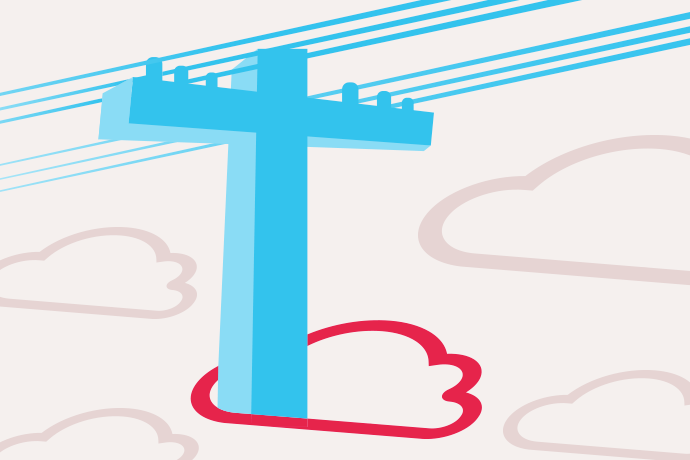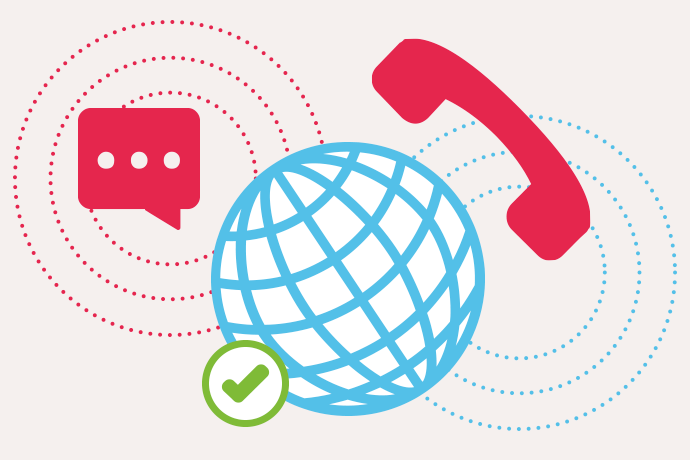Cart Total
$0.00
-
Your shopping cart is empty
Loading

Hello! Log in Your Account
New customer? Start here


|
5 min read
Contents
Quick Summary
How cost-effective is VoIP? Is VoIP secure? How fast does my Internet need to be? We answer these questions and more.
Hosted VoIP services are often misunderstood, and many small businesses have concerns that get in the way of them using one. That’s unfortunate because many of these fears are unfounded. But it’s understandable because when you’re in a small business, every penny counts.
In this article, we’ll address these concerns so your small business can decide whether hosted VoIP is right for you.
With all the free VoIP services available like Skype and Google Voice, why pay for a business VoIP service? Skype and Google are household names, after all. If they’re trustworthy and they’re free or very low cost, why spend more?
The truth is, while you might save some money using a free service, you have to ask yourself what you’re giving up as a result. A hosted VoIP setup offers a superior caller experience to both free VoIP and ageing PSTN services, giving you more opportunities to make your customers feel valued and respected. This helps you earn their trust and loyalty over the long term.
Plus, a professional phone system offers more numerous and more effective features and methods of internal communication. Business instant messaging, for example, accompanies high-quality VoIP and video calling to create cohesion and effective collaboration throughout your business.
In summary, like with most things, you get what you pay for. A business VoIP system is going to provide the robust structure that you need to maintain high-quality customer interactions, coupled with first-class support you can rely on. Cutting costs also means cutting on the quality of the caller experience you’re able to offer. Skype, WhatsApp and Google Voice don’t allow you to manage call routing based on the time of day, set professional hold music or use an open VoIP API to create your own features.
One of the largest downsides of a free service is that you don’t exactly know what is happening with your data. For companies who are looking to protect their intellectual property, this can become a serious concern. You don’t want to find yourself in a position where your data is compromised because you didn’t invest in the right system.
Even services aimed at the end-consumer that claim to put security first, like WhatsApp, are owned by companies with a sketchy track record for protecting their users’ data and using it in an ethical way. Even then, these services lack the granular control and powerful functionality that modern businesses demand.
Yay.com encrypts all its calls and text messages with TLS. Messages are stored in an encrypted database on our side too. This means that even if a bad actor were to gain access to our platform, they still wouldn’t be able to read any of your correspondences. Any good business VoIP provider would do the same, setting themselves apart from consumer-grade services.
In addition, a hosted VoIP solution is reliable thanks to best load-balancing and distribution practices. Platform redundancy is invaluable in the event of a server failure on your provider’s side, ensuring that your phone system stays online. When providers take these steps, the chances of your lines of communication with customers being cut off are rock bottom.
Cybercrime is on the rise and it’s clear that security matters for any business that is looking to innovate. It’s worth paying for a phone system that understands this reality and is built to manage those security concerns for you.
Many small businesses worry that the hardware investment required for hosted VoIP would be prohibitive and place an unreasonable burden on the budget. This isn’t the case today thanks to VoIP apps.
Users can use their own smartphone or laptop rather than having to use a dedicated desk phone. Leveraging the flexibility that VoIP apps offer minimises upfront hardware costs for your business.
Your internet connection doesn’t need to be hugely fast to make the most of a VoIP system. The only requirement is that it needs to be relatively stable. In fact, VoIP only needs around 80kbps upload and 80kbps download speed for each simultaneous call. So not a lot of bandwidth at all and a lot less than would be used streaming the latest series on Netflix.
With that being said, the beauty of such a system is that if your internet connection is giving you trouble, you can quickly and easily switch to a mobile network or another type of connection. This means you can build backup options to ensure your VoIP services are always active and ready to go.
These are some of the common reservations small businesses have towards VoIP. Hopefully, we’ve managed to assuage any fears you might have that it’s worth the investment to adopt a business VoIP service.
Hosted VoIP systems are powerful tools for small businesses that supercharge their communications. With a bit of investment, you’ll get a high-quality professional phone system that is secure and scalable.


Explore how Skype's end-of-life announcement presents an opportunity for small businesses to upgrade their Skype number to a VoIP phone system.
Posted March 10 2025 | 6 min

Everything you need to consider when moving offices, from hardware to call quality.
Posted January 16 2025 | 6 min

Corded headsets vs wireless headsets? Learn about the key considerations when purchasing a VoIP headset for your VoIP phone system and softphone apps.
Revised December 3 2024 | 9 min

VoIP is incredibly well suited to being the phone system for businesses of all sizes. Large businesses in particular can benefit from great scalability, bulk-deployment options and more.
Revised August 21 2024 | 8 min

Examining the differences between VoIP and PSTN communications solutions and VoIP benefits.
Posted July 16 2024 | 5 min

Get your business up to speed before the PSTN and ISDN switch off in 2027. Discover what digital VoIP technologies will mean for business landlines in the future.
Revised July 15 2024 | 6 min

With the upcoming switch from PSTN to VoIP, we look at what processes other countries have taken when they decided to migrate their own copper line networks.
Posted August 1 2023 | 6 min

VoIP apps or VoIP desk phones, which is better and why? We discuss how VoIP desk phones could be obsolete with the availability of greater and more powerful VoIP apps .
Revised November 2 2022 | 7 min

Cloud VoIP phone systems offer key advantages for businesses. Here are 13 of VoIP's key benefits that have helped to drive the adoption of business VoIP.
Revised May 10 2022 | 12 min

VoIP won't work without the internet, but that doesn't mean you need a wired broadband connection. A supplemental mobile cellular data network (4G, 5G, LTE) can make VoIP calls possible even if broadband is unavailable.
Posted January 11 2022 | 5 min

Offer great customer service, but do so efficiently. Automate aspects of your phone system and provide self-service information to free staff resources.
Posted September 24 2021 | 4 min

Call recording is a feature of good VoIP phone systems that allows customers to record their business calls, then playback and download them.
Posted September 17 2021 | 6 min

Large corporations have requirements that surpass the capabilities of most phone systems. With Yay.com build your ideal business phone system effortlessly.
Revised August 25 2021 | 5 min

A good business phone system will help you run day-to-day operations more efficiently and effectively. Here are 5 ways yours can improve customer satisfaction.
Posted August 19 2021 | 4 min

Features like call parking and shortcodes can boost the efficiency of your business phone system, saving your teams time.
Posted August 18 2021 | 6 min

Learn what VoIP 'QoS' or Quality of Service is and why your business network needs it configured for the best VoIP experience.
Posted March 9 2021 | 3 min

With Yay.com's free VoIP trial you can try business VoIP for free for fourteen days - no credit card required. Enjoy all of our powerful business phone system features at no cost.
Posted December 3 2020 | 4 min

Business VoIP makes it possible to work from anywhere. We'll get you up and running for working from home, no matter whether you prefer VoIP desk phones or VoIP apps.
Posted November 12 2020 | 3 min